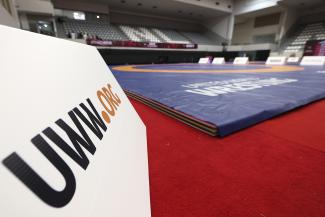Techniques, safety, focus: UWW referees ready for Paris 2024
Thursday, August 1, 2024 - 09:40 By United World Wrestling Press

ATHENS, Greece (August 1) -- United World Wrestling referees for Paris 2024 completed a three-day seminar from June 21 to 23, hosted by the Greek Wrestling Federation in Athens. The seminar was held to prepare for the Olympics, where referees will be ITOs.
The program consisted of self and group analysis of previous performance, theoretical study, mental preparedness, medical and safety training as well as on-the-mat training with Women's Wrestling, Freestyle, and Greco-Roman wrestlers and coaching experts.
Led by the President of the UWW Athletes Commission, Arsen JULFALAKYAN, as well as coaches Alfred TER-MKRTCHYAN, Patrick NUDING and Amiran KARDANOV and wrestlers Maria PREVOLARAKI (GRE) and Christos KOUTSOURIDIS (GRE), referees analyzed common wrestling techniques and tactics in all styles and the proper philosophy and mechanisms referees should utilize when evaluating these situations.

During these sessions, Julfalakyan also emphasized concerns and questions he receives from wrestlers and how we can improve the communication between athletes and referees when discussing the application of the rules.
Mental strength training sessions were led by Holger KNOLL, a trained mental strength coach specializing in athlete training. His sessions focused on how referees can improve their concentration and focus before, during and after competitions.
Babak SHADGAN, President of the UWW Medical Commission, provided medical and safety training, with focus on the role a referee plays in injury prevention.
In addition to the referee's instruction, Tristan MORAD, UWW Sports Department Coordinator, provided a presentation on the logistics and schedule of the wrestling of Paris 2024.
United World Wrestling and the UWW Referee Commission graciously thank the Greek Wrestling Federation and its President, Stergios LEONKIS, and UWW Bureau Vice President, Theodore HAMAKOS and numerous volunteers for their organization and hospitality in hosting the seminar.


Share your thoughts.
Comments